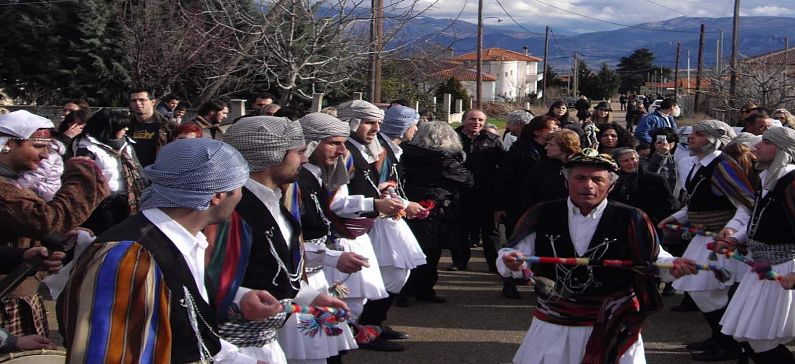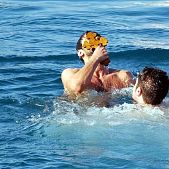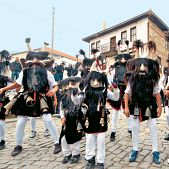
Epiphany’s traditions
Epiphany in Greece is known as Theofania or Fota. The first sanctification of the Epiphany takes place in church on the eve of the holiday. Afterwards, the priest goes from house to house holding a cross and a basil branch. As he walks through each house, he uses the basil to sprinkle and bless all the areas of the home. On Epiphany, the Greek Orthodox Church performs the ‘Great Blessing of the Waters’. This ceremony is usually performed twice, once on the eve of Epiphany which is performed in the church, and then again on the actual day outdoors with priests blessing large bodies of water, sea, rivers, lakes etc.
Οne of the main traditions of the Epiphany holiday is the Kalanda (carols) sung by children on Epiphany’s Eve over sweets or a small amount of money. From the numerous versions of the Kalanda only those sung on Patmos island retain their original and fully oriented religious character. These Kalanda begin with the creation of the world, the creation of waters by God, and finally end with the day of Jesus Christ’s Baptism in the Jordan river by John the Baptist.
Across Thessalia, on Epiphany’s Eve the Rougkatsia (also Rougkatsaria) are the main attraction of the holiday with groups of 10 to 15 persons dressed up in costumes, wandering from house to house singing the celebrating carols and hoping for a small amount of money in return. Every group must definitely feature a groom and bride (a young man dressed as a woman), priest, grandfather, doctor and the “arkoudiarides” (owners of bears that made the animals dance for the public’s entertainment in Greek rural areas since 1970).
People in Kastoria and Kozani have a similar tradition called the Ragkoutsaria. People put on their symbolic and scary painted masks in order to exorcise the evil spirits from the city. The masked men beg from passersby for their rewards for casting the evil spirits away. The same custom is also found in villages near the city of Drama, northeastern Greece.
There it is called the rokatzaria and people wear scary masks and make deafening noises with the bells they are carrying while walking around. In other villages near Drama and Kavala, the traditions of “arapides” (black men) revives with men wearing sheepskin and dozens of bells. It is said that the arapides were warriors that took part in Alexander the Great’s wars and helped him scare away the Indian elephants in battle with the thundering sounds they made.
Another version of the ragkoutsaria are the Pontian Momogeroi, a traditional celebration taking place the week before the new year. Each participant is dressed up with a certain costume typical of the Pontian culture and way of life.
In the peninsula of Halkidiki, northern Greece, the Fotarades custom is praised each year. The “king” is dressed in the talagani (the traditional cape worn by shepherds) and many bells and leads the dance, while the fotarades are bearing their swords made of wood to deter anyone from attempting to steal the sausage placed in the middle of the circle. On Epihany’s Eve, young men sing the Kalanda and get meat, sausages and money in return, while on Jan. 7 (celebration of John the Baptist) they dance traditional dances in the village’s square..
An old custom in Crete was the preparation of the fotokoliva (boiled wheat with peas) on the eve of Epiphany. The fotokoliva was eaten by the people, but they also fed it to their livestock, which was believed to insure good health and fortune in the homes.
The “yala-yala” revives in Hermione, Argolis, for more than 50 years. Similar traditions survive in many fishing villages in the area, such as Porto Heli and the Koilada. In the dawn of the Epiphany, the boys who are joining the army for the new year, gather together, eat all together and then visit all the houses of the area, wearing traditional naval costumes and singing “yala – yala”.
In Lefkada, on the eve, the tradition of the “oranges” is observed. The believers dive to the sea with the oranges they hold in their hands and which are tied together by string. Then, they take them home for blessing and leave one of them for a whole year in the house. Before the Holy Cross diving ceremony, the old oranges are thrown into the sea.















